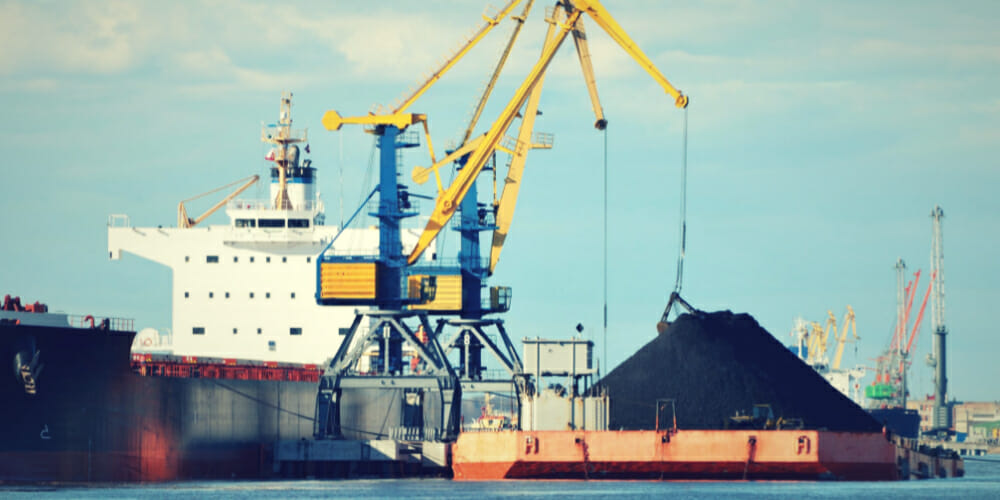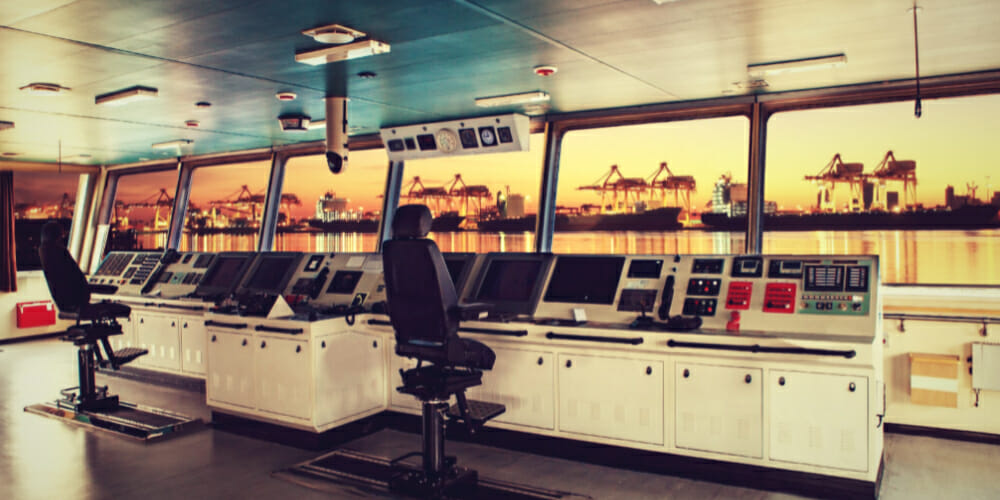The marine transportation industry employs a large workforce, with opportunities for those with the right skills and qualifications. So, how many jobs are available in marine transportation?
There are a variety of roles within marine transportation, from deckhands and captains to engineers and logistics coordinators. Jobs are available on many vessels, from small boats to large cargo ships. The demand for marine transportation services is constantly changing, so the number of jobs available can vary.
If you’re interested in a career in marine transportation, this article has got you all covered!
What Is Marine Transportation?
Marine transportation is the process of moving people or goods by water. This can be done via boat, ship, barge, or other watercraft. Marine transportation is vital to the global economy, as it allows for transporting goods and materials between different countries and continents.
There are different types of marine transportation, each with its own advantages and disadvantages. Some of the most common types of marine transportation include:
Bulk Carriers
Bulk carriers are used to transport large quantities of unpackaged goods, such as coal, grain, and iron ore. These vessels have a large capacity and specialized equipment for loading and unloading their cargo.
Due to the nature of their cargo, bulk carriers have unique design features, such as open tops and hatches, that allow for easy loading and unloading. They also often have large cranes on board for this purpose.
General Cargo Ships
General cargo ships are typically used for transporting a variety of goods, ranging from raw materials to finished products. These ships often have multiple levels and storage areas, allowing them to carry a large amount of cargo at once.
These vessels also come in a range of sizes, with smaller ones suitable for coastal or intra-island transport and larger ones capable of crossing oceans.
Container Ships
Container ships are a type of marine transportation that allows for the efficient transport of goods in large containers. These vessels can carry thousands of containers at once, allowing for a significant amount of goods to be transported at one time.
Due to their size and capability, container ships play a crucial role in global trade and commerce.
Tankers
Tankers are large ships used to transport oil and other liquids across the ocean. They have a unique shape, with a rounded front and rear and a flat bottom, in order to maximize their carrying capacity. The size of tankers can vary greatly.
Due to the highly flammable nature of their cargo, tankers must adhere to strict safety regulations and have specialized equipment for containing any spills or fires.
Barges
Barges are typically used for transporting large quantities of goods, such as coal, grain, and oil. They can also be used for construction projects or to transport vehicles and heavy equipment.
Despite their size and heavy cargo capacity, barges have a low environmental impact compared to other modes of transportation. This is because they often travel along inland waterways, using less fuel and emitting fewer pollutants.
Maritime Vs Marine Transportation
There is a lot of confusion about the difference between maritime and marine transportation.
Maritime transportation refers to the movement of goods and people by sea using ships, boats, and other water vessels. Marine transportation, on the other hand, encompasses all modes of transportation that take place in the ocean, including not only ships but also oil rigs and underwater tunnels.
While both industries play a vital role in global trade and commerce, marine transportation also includes activities such as offshore drilling and ocean research. Additionally, marine transportation often involves navigating rough or unpredictable waters, whereas maritime transportation typically takes place in more controlled environments such as ports and harbors.
Marine transportation can be further divided into two categories: bulk shipping and container shipping.
Bulk Shipping
Bulk shipping refers to the transportation of large quantities of goods, usually in a loose, unpackaged form. This type of shipping is commonly used for materials such as coal, grain, and oil.
Bulk shipping typically utilizes specialized vessels known as bulk carriers, which have features such as retractable hatches and conveyor systems to facilitate the loading and unloading process.
Container Shipping
Container shipping refers to the transportation of goods using containers that can be easily loaded onto ships, trains, and trucks. This method of shipping has revolutionized global trade by making it easier and more efficient to transport large quantities of goods. This is the most common form of maritime transport, as it allows for a higher degree of standardization and efficiency.
Marine Transportation in the U.S
The United States has one of the world’s largest and most advanced marine transportation systems. Marine transportation plays a vital role in the nation’s economy, accounting for nearly $361 billion in GDB and supporting more than 2.2 million jobs in 2020.
The U.S. Department of Transportation’s Maritime Administration (MARAD) supports the following goals:
- Improve the safety and security of the marine transportation system
- Enhance the efficiency of the marine transportation system
- Protect the environment
- Promote the competitiveness of the U.S. maritime industry
MARAD is committed to working with the maritime industry, federal agencies, and other partners to ensure that the U.S. marine transportation system remains safe, secure, and efficient.
The industry is heavily regulated by the federal government, ensuring safe and efficient operations. The U.S. Coast Guard is responsible for enforcing these regulations, as well as conducting search and rescue missions and protecting the marine environment.
However, the industry faces challenges such as aging infrastructure and a shortage of qualified workers. These issues must be addressed in order to maintain the efficiency and competitiveness of the industry. Overall, the marine transportation industry in the U.S plays a vital role in domestic and international trade, and efforts must be made to ensure its continued success.
Available Jobs in Marine Transportation
There are a variety of available jobs in marine transportation. Marine transportation workers move people and goods by water on vessels such as boats, barges, and ships. Some workers pilot the vessels, while others work as deckhands or stewards.
Most marine transportation workers are employed in the merchant marine, which includes all civilian vessels that transport cargo and passengers. The merchant marine is a critical part of the economy, as it helps to move goods and materials worldwide.
There are also jobs available in the military and law enforcement. Marine transportation workers in military operations and maintain ships used for combat or other purposes. Law enforcement officers use boats to patrol waterways and apprehend criminals.
Marine transportation workers must have a high school diploma or equivalent. Some jobs may require additional training or certification. Marine transportation workers typically work long hours and may be required to work weekends and holidays. Jobs in the merchant marine are often considered dangerous, as workers are exposed to the elements and potentially hazardous materials. Here are some available jobs in Marine Transportation:
Ship Captain
A ship captain is responsible for the safe operation of a vessel. The average salary for a ship captain is $81,640 per year. The responsibilities of the ship captain include navigating through the waters, managing the ship’s schedule and cargo, and maintaining a proper communication with other ships and ports. A ship captain must also comply with all relevant laws and regulations and adequately handle any emergencies that may arise.
Chief Mate
Chief Mate supervises and coordinates the activities of deck crew members. This includes overseeing cargo operations, navigational procedures, and maintenance of deck equipment. Chief Mate also ensures that all safety protocols and regulations are followed on board the ship. In addition, the chief mate works closely with the Captain to plan and execute the ship’s voyage, including routes and schedules. The average salary for a chief mate is $122,803 per year.
Marine Pilot
Marine pilot is responsible for safely and efficiently navigating vessels through waterways. This also includes ensuring that all necessary paperwork and preparations are in place before departure and staying alert and aware of any potential hazards during the journey. The average salary for a marine pilot is $87,785 per year.
Deck Officer
Deck Officer is responsible for overseeing all operations on the ship’s deck and ensuring the safety of the crew and passengers. The job also includes navigation, mooring, cargo operations, and deck maintenance. The average salary for a deck officer is $98,530 per year.
Deck Hand
Deck Hand is responsible for performing maintenance and repairs on the vessel. The job includes actions such as painting, chipping, and cleaning. The average salary for a deckhand is $56,163 per year.
Marine Engineer
A Marine Engineer designs, develops, tests, and oversees the construction of maritime vessels and systems. Marine Engineers work in a variety of industries, including shipbuilding, offshore oil and gas exploration and production, naval architecture, and marine engineering. The average salary for a Marine Engineer is $93,370 per year.
Marine Electrician
As a marine electrician, you will be responsible for installing, maintaining, and repairing electrical systems on vessels of all sizes. Your duties will include reading and interpreting blueprints, wiring schematics, and other technical documents, installing and testing electrical equipment, and troubleshooting electrical problems.
You must be able to work independently and have excellent problem-solving skills. The average salary for a marine electrician is $58,568 per year.
Marine Mechanic
Marine mechanics maintain and repair boats and other watercraft. This can include everything from engines to hulls and everything in between. If you want to apply for this job, you must be knowledgeable about a variety of different boat types and how they work in order to properly diagnose and fix problems. The average salary for a marine mechanic is $45,490 per year.
Maritime Lawyer
A maritime lawyer is a specialist legal professional who deals with cases and disputes relating to the sea. Maritime law is a distinct area of law that covers a wide range of topics, including shipping, navigation, environmental law, and marine insurance.
Maritime lawyers must have a good understanding of both national and international maritime organization law, as well as the specific legal issues relating to the sea. The average salary for a maritime lawyer is $78,595.
Steward/Cook
The responsibilities of a steward/cook include preparing food, cleaning the kitchen, and serving meals. They may also be responsible for menu planning and ordering supplies. The average salary for this position is $39,000 per year.
Currently Available Jobs in the Marine Transportation Industry
The maritime transportation industry offers a wide variety of job opportunities for those with the right skills and qualifications. From deckhands and engineers to captains and navigators, there are many positions available for those looking to get started in this field.
In addition, there are also many great opportunities for experienced maritime professionals. With so many different types of vessels out there, there is always a need for qualified and experienced personnel. Whether you are looking for a full-time or part-time position, there are many options available in the maritime transportation industry.
Some of the most popular positions in the maritime transportation industry include:
- Deckhand
- Engineer
- Captain
- Navigator
- Pilot
- Dispatcher
- Planner
Required Education & Training
Most jobs in the marine transportation industry require at least a high school diploma, but many positions also require specialized training or certification. Some jobs, such as deck officers and engineers, require a bachelor’s degree from a maritime academy or other accredited institution.
Deck officers are responsible for the navigation and operation of the vessel, as well as the safety of the crew and passengers.
Engineers are responsible for the maintenance and operation of the vessel’s engines and other machinery. Both deck officers and engineers hold a Merchant Marine Engineer license from the U.S. Coast Guard.
Other positions in the marine transportation industry, such as deckhands, stewards, and cooks, do not require licenses or specific degrees but may require on-the-job training.
Eligibility Criteria
To be eligible for employment in the marine transportation industry, you must meet the following criteria:
- Be at least 18 years of age
- Have a high school diploma or equivalent
- Possess a valid driver’s license
- Be able to pass a background check and drug test
- Have no felony convictions
- Be a U.S. citizen or have a valid work visa
If you meet all of the above criteria, you should have no problem finding employment in the marine transportation industry. There are many different types of jobs available, so be sure to research the options and find the one that’s right for you.
Average Salary
The average salary for marine transportation jobs is $84,120 per year. This industry employs various workers, including captains, mates, deckhands, engineers, and other support staff. Salaries can vary based on experience and position. Some jobs in this field may also offer benefits such as health insurance and retirement plans.
Challenges in the Marine Transportation Industry
The marine transportation industry faces numerous challenges, including a constantly changing regulatory environment, increasing competition, and rising operating costs. These challenges require innovative solutions and strong leadership for the industry to continue thriving. Here are common challenges in the marine transportation industry:
Environmental Impact
One of the biggest challenges is the environmental impact of maritime shipping. For example, large cargo ships can produce large amounts of air pollution, including greenhouse gases. Maritime shipping also causes water pollution, and it can hurt marine life.
Life Risk
The risk of injury or death is one of the biggest challenges facing the marine transportation industry. Maritime workers are exposed to various risks, including drowning, falls, and collisions.
The maritime industry is one of the most dangerous industries in the world, with accidents that can have devastating environmental consequences, such as oil spills and contamination. Companies must prioritize safety and implement strict regulations and procedures to reduce these risks.
Detachment From Family
Another challenge facing maritime workers is the need to be away from family for long periods. Maritime workers often have to spend months at a time away from home, which can be difficult for families.
This is especially true for maritime workers who have young children. It can be challenging for parents to be away from their children for long periods, and it can be difficult for children to adjust to having a parent gone for long periods.
Financial Risk
The marine transportation industry is subject to market fluctuations, with fuel prices and global economic conditions impacting profitability. Companies must closely monitor market trends and make strategic financial decisions to mitigate these risks.
Boredom
Boredom is another challenge facing maritime workers. Many maritime jobs are repetitive and can be quite boring. This boredom can lead to several problems, including fatigue, mistakes, and accidents.
To combat boredom, maritime workers need to find ways to stay engaged with their work. This can include finding ways to make their work more interesting, such as by adding variety to their tasks.
FAQs
How Many Ships Are There in the World in 2022?
According to the International Chamber of Shipping, more than 50,000 merchant ships were operating in the oceans in 2022. As global trade increases, this number is expected to grow in the next few years. This increase in maritime traffic can be attributed to the growing global economy. As more countries trade, the need for ships to transport goods increases.
Is Marine Transportation a Good Career Path?
Yes, marine transportation is a good career path for those interested in working on the water. As a marine transportation professional, you can expect competitive pay and ample opportunities for advancement. In addition to the financial benefits, you will have the unique opportunity to work in diverse environments, such as ports, harbors, rivers, lakes, and oceans.
This dynamic job allows for constant growth and exciting challenges. If you are interested in joining a growing industry with numerous opportunities for success, consider a career in marine transportation.
Are Maritime Jobs in Demand?
Yes, maritime jobs are in high demand due to the continued growth of the global economy and the need for efficient transportation of goods. This demand is only expected to increase in the coming years, making maritime careers a great option for those looking for stable, well-paying jobs.
What is a Transportation Specialist?
A transportation specialist is responsible for planning and arranging all aspects of transportation for my company. The job includes determining the most efficient and cost-effective modes of transportation, coordinating schedules and routes, managing shipping documentation, and ensuring the safe arrival of goods or individuals.
Conclusion
The maritime industry employs millions of people and supports many more jobs in related industries. If you’re interested in a career in marine transportation, there are plenty of opportunities available.
With the right training and experience, you could be working on board a ship, in a port, or at a maritime company in no time. It’s best to research and prepare yourself according to the marine transportation job you are applying for!






